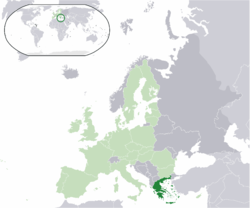Greece Awaits Its Destiny – OpEd
By VOR
By Andrey Fedyashin
The eurozone’s debt crisis remains the focus of attention of the EU leaders. On Monday, France and Germany agreed upon a plan to set up a new body to coordinate the debt problems of Greece, Spain and Italy. In late September-early October, the “troika” of international money lenders – the European Commission, the European Central Bank and the International Monetary Fund – will assess the economic and financial situation in Greece and its ability to fulfill the terms of new loans.
Depending on the “troika”’s conclusions, Greece may or may not obtain further financial support. The latter scenario will inevitably mean default followed by subsequent expulsion from the eurozone. If Greece is not saved now, next year it may be too late. 2013 is the election year in Germany. Although Chancellor Angela Merkel has repeatedly said that she would like Greece to stay in the eurozone, Merkel’s chief partner in the CDU-CSU ruling coalition, Bavaria’s Christian Social Union, has grown visibly displeased with her softness towards the slovenly Greeks. Alexander Dobrindt, Executive Secretary of the Christian Social Union of Bavaria, said in an interview with the Bildt magazine that he did not see how Greece’s withdrawal from the eurozone could possibly be avoided next year. Similar moods seem to prevail among Merkel’s right-wing allies in the Christian Democratic Union. If Bavaria’s Conservatives break away from Merkel, she can hardly hope to win the 2013 Bundestag polls.

Everyone is hoping that the “troika”’s report on Greece will give Athens a much needed respite and a regular loan tranche.
Russian analysts think that talk of Greece’s parting with the euro is premature. In the opinion of Andrei Gritsenko, General Director of Capital-Asset Management, it will cause more harm than good:
“For the time being, Greece will hardly quit the eurozone. Angela Merkel has been persistently trying to prevent that. The “troika”, I believe, will pass some decisions depending on its analysis of the situation. Perhaps the aid will be halved, or something of the sort. I don’t think that Greece will pull out, at least not in the foreseeable future.”
Alexei Vyazemsky, an analyst with the Kalita-Finance Group, disagrees. He views Greece’s expulsion as something quite realistic. Certainly, it will be a blow to the euro, but Russia has nothing to be afraid of, he says:
“The eurozone crisis concerns Russia too since Europe is the largest consumer of our energy resources. The escalation of the debt crisis will cause a drop in demand. As a result, the economy will no longer need as much oil and gas as it currently imports. That means that the exports of our raw materials corporations – Gazprom, Rosneft, Lukoil and others – will also decrease. But from the point of view of finances, we have nothing to fear because our state debt is very small compared to western countries, and our Central Bank has huge gold and currency reserves.”
Meanwhile, Greece is trying to form a new austerity package in order to meet the EU terms. Prime Minister Antonis Samaras said recently that Greece was not asking for more money but just needed a chance to come up for a breath of air in its deepwater dive.
